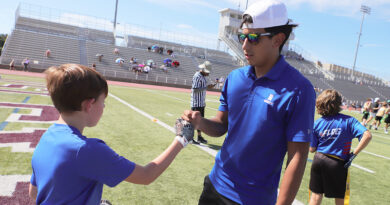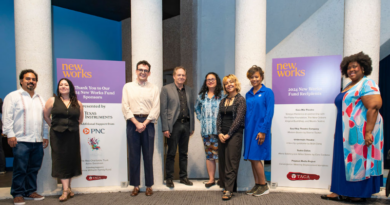Widow Finds Catharsis in Yoga Therapy
After months of seizures, headaches, neurological problems, and MRIs that were inconclusive, Kirsten Burch said she and her husband were almost relieved to hear his brain cancer diagnosis.
However, it was also a wake-up call.
“When my husband got his diagnosis, we sat together on the couch and he said, ‘Kirsten, I’m sorry we didn’t move to Belize to become dive masters. I’m sorry we didn’t run away and do something fun. I’m sorry we kept looking forward to what’s next and we didn’t live now,’” Burch said.
Burch and her husband, Judson, a Highland Park native, met as executives at their corporate job. They were working 60 hours per week and not taking care of their bodies and health.
When Judson was diagnosed with brain cancer, however, Burch knew they needed to make a change if they were going to fight it.
“We got more into yoga,” Burch said. “We turned our diet organic. We did massage and acupuncture.”
That was in 2012, the same year Burch’s stepfather died of complications from emphysema and her father died of lung cancer. The doctor gave Judson six months to live. He lived for 20, dying in January 2014.
Today, Burch teaches yoga therapy at The Yoga Movement near SMU. It’s because of her own experience that she is so passionate about what it can do for the mind and body.
She said she weighed 154 pounds when her husband died and was sent into early menopause. After nine months of yoga therapy, she was down to 110 pounds, the hot flashes went away, and, according to Burch, she was managing life better than most widows.
“What yoga therapy allows you to do is rewire your neurological patterns,” Burch said. “So your asymmetric movements — you’re rewiring what’s going on in your mind. You’re making your body and your mind and your breath do something it’s not used to doing.”
Through teaching, Burch helps others, whether they have experienced a painful loss or they just need time to slow down.
Carol Mazetti, a flight attendant from University Park, said Burch is generous with her support.
“She is so supportive of everybody in class,” Mazetti said. “I’ve been in class between a 20-something SMU student, who was like a rubber band, and a lady that I found out later was 78. You wouldn’t think that somebody could teach a class like that, but Burch did it.”
Burch retired from her office job in October 2012, after Judson’s first brain surgery.
“It was like having a toddler with Alzheimer’s,” she said. “He couldn’t be left alone, but he was a grown-up. He would have a seizure at any point or he would forget the oven was on.”
Burch explained that she or his parents had to sit with him at all times. Due to his short-term memory loss, he would wake up and not remember he was sick.
“He didn’t want to be treated that way,” Burch said. “So I would have to wake up and tell him, ‘Hey, baby. We’re not in a fight. Everything is OK. You’re sick. Your legs don’t work and this is what’s going on.’ We would start every day like a brand new day.”








